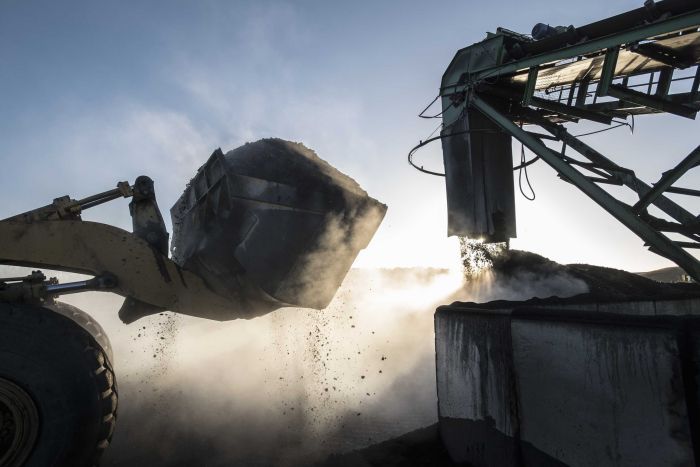Australia refuses to let go of coal
October 11, 2018 | Expert Insights

The Australian government has backed the use of coal power, despite recommendations by the UN’S Intergovernmental Panel on Climate Change to phase it out by 2050.
Background
Coal is mined in most provinces of Australia. About 75% of the coal that is mined in Australia is exported to eastern Asia and the balance is used in generating electricity. 60% of the nation's electricity is currently produced in coal-fired power stations. In 2016, Australia was the biggest net exporter of coal.
The key issue for the Australian coal industry now is global warming and CO2 emissions. Coal mining has been criticized by members of the environmental movement due to carbon dioxide emissions during combustion. This criticism is mainly directed at thermal coal, for its connection to coal-fired power stations as a major source of carbon dioxide emissions, and the link to climate change and the effects of global warming on Australia The burning of coal for electricity produces 29% of Australia's total greenhouse gas emissions, based on 2013-2014 Clean Energy Regulator data.
Analysis
Australia’s mining industry and Morrison government have rejected the Intergovernmental Panel on Climate Change report’s call to phase out all coal fire power by 2050, claiming renewable energy cannot replace baseload coal power.
The Intergovernmental Panel on Climate Change's special report, released on Monday, concluded nations must stop using coal by 2050 to avoid increasing the global temperature by more than 1.5C and would require a "global transformation" of all sectors of the economy.
The report contains bad news particularly for Australia’s Great Barrier Reef; it predicts that if the planet hits 2C of warming more than 99 per cent of the world’s coral will be wiped out. Despite this warning, along with the droughts and heat waves that are likely to aggravate Australia’s already extreme conditions, ministers are unwilling to commit to phasing out fossil fuels. Besides coral reef extinction, these would include regular Arctic sea ice disappearance and millions of people in low-lying areas being forced from their homes by rising tides.
The world’s biggest coal exporter said it would be “irresponsible” to comply with the recommendation by the UN’s Intergovernmental Panel on Climate Change (IPCC) to stop using coal to generate electricity. Prime Minister Scott Morrison said on Monday that Australia would stick with its primary Paris commitment - to reduce carbon emissions by 26-28 per cent from 2005 levels by 2030 - but would not give any more money to a global climate fund that aims to help the world's poorest countries cope with the effects of climate change.
Mr Micheal McCormack, Australia’s Deputy PM, said that coal mining was vital for Australia as it provides 60 per cent of the nation’s electricity, 50000 jobs and a major component of its exports
However, the IPCC report's authors said the world would face severe consequences if the great bulk of fossil fuels including coal, oil and gas, weren't left in the ground.
CSIRO research scientist Pep Canadell, executive director of the Global Carbon Project, said the special report was the last reminder that there were no insoluble biophysical or technical impediments to meet the lowest temperature targets in the Paris Agreement.
However, Dr Canadell said it would require “almost immediate establishment of a global carbon market, carbon pricing across all sectors of the economy, massive energy efficiency gains, significant consumer changes in diets, actions to reduce peak global population, and the immediate and growing deployment of options for the direct removal of carbon dioxide from the atmosphere, including the pervasive need for carbon capture and storage in most cases”.
There would be drastic changes in land use, including reforestation and planting crops for energy to suck carbon dioxide from the atmosphere and burying emissions when they were burnt.
The coal lobby is pushing a technology known as carbon capture and storage (CCS) as a solution. CCS involved capturing CO2 produced through the burning of fossil fuels like coal and trapping it deep in the ground.
Counterpoint
Federal Resources Minister Matt Canavan believes that Australian coal is the envy of the world. He says it creates less pollution and supports the jobs of many Australians.
Assessment
Our assessment is that coal is a crucial part of the Australian economy. It has been the central power generation system that the country was depended on since the end of World War II. It has also helped in generating wealth in the country, however, over the years, it has also led to the slow death of the Great Barrier Reef.
We believe that although the IPCC reports have made suggestions to phase out coal power, the government of Australia can make a move only, if it can find an alternative to generate wealth, create employment and stabilize the economy. Also, the IPCC report has ignored the fact that many developing nations were using Australian coal. Therefore, we feel that although the report pushes for a cleaner environment, solutions haven't been provided.








Comments